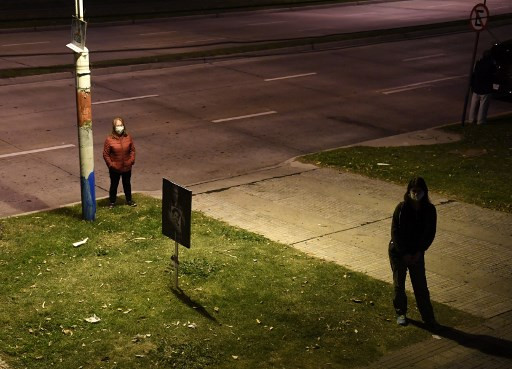Popular Reads
Top Results
Can't find what you're looking for?
View all search resultsPopular Reads
Top Results
Can't find what you're looking for?
View all search resultsIn Brazil's shadow, laid-back Uruguay curbs COVID-19
Uruguay moved fast in March when the first cases were detected. It introduced a voluntary quarantine, widespread monitoring and tracking of infections, randomized tests, and use of models to predict how the disease would progress in different parts of the country.
Change text size
Gift Premium Articles
to Anyone
 Women stand next to a portrait -part of an urban intervention- as they keep a security distance while watching a screen displaying images of those disappeared during the military dictatorship (1973-1985), at a housing complex, in the framework of the commemoration of the Marcha del Silencio (March of Silence), which due to restrictions on the COVID-19 pandemic, is being held virtually through social media and street interventions, in Montevideo, on May 20, 2020.With no deaths since May 23, government adviser Rafael Radi described the situation last week as being under "relative control."
(AFP/Pablo Porciuncula)
Women stand next to a portrait -part of an urban intervention- as they keep a security distance while watching a screen displaying images of those disappeared during the military dictatorship (1973-1985), at a housing complex, in the framework of the commemoration of the Marcha del Silencio (March of Silence), which due to restrictions on the COVID-19 pandemic, is being held virtually through social media and street interventions, in Montevideo, on May 20, 2020.With no deaths since May 23, government adviser Rafael Radi described the situation last week as being under "relative control."
(AFP/Pablo Porciuncula)
L
eonardo Silveira, a bookstore owner in Montevideo, is hopeful about the future as Uruguay begins a gradual reopening. The small country has kept rates of COVID-19 at one of the lowest levels in Latin America, even as the region becomes a coronavirus epicenter.
The South American nation of 3.5 million people, known for its beef, laid-back lifestyle and legalized cannabis, has recorded 789 confirmed cases of the novel coronavirus and 22 deaths. That's around 23 cases per 100,000 people - versus nearly 200 cases per 100,000 in Brazil.
Uruguay moved fast in March when the first cases were detected. It introduced a voluntary quarantine, widespread monitoring and tracking of infections, randomized tests, and use of models to predict how the disease would progress in different parts of the country.
With no deaths since May 23, government adviser Rafael Radi described the situation last week as being under "relative control."
Now it is easing the economy open, including a staggered restarting of schools. Some are calling it the New Zealand of Latin America, given its similar population size and number of deaths.
In May, customers started appearing in the bookstore who had not come for a long time, said Silveira.
"People come not only to buy books but to see you and talk for a while. It's a happy thing to see them - at a distance but together here in the shop," he said.
As well as Brazil, neighbors like Chile, Peru, Argentina and Bolivia have far higher rates of infection than Uruguay.
Paraguay has kept cases at a similar level but with much tougher measures, including using the military to enforce its lockdown.
Adriana Garcia Da Rosa, 57, a pediatrician in Montevideo, said the success was down to good government planning, while flu inoculations had helped keep pressure off the health service from seasonal illness.
"Uruguay's population responded well and abided by government regulations, making it possible to control the pandemic effectively," she said.
Giovanni Escalante, Uruguay's representative at the Pan American Health Organization, said the country's success was down to a rapid response, robust measures, and the creation of a crisis committee led by health and epidemiological experts.
Only a handful of the country's approximately 650 intensive care unit beds available for COVID-19 patients are currently occupied, he said.
But a shadow remains. Uruguay shares a northern border with Brazil, which now has the second highest number of recorded cases in the world.
The border city of Rivera has seen cases tick up and Uruguayan officials fear the still open border remains a "weak point," government adviser Radi said.
The arrival of the southern hemisphere winter is another concern.
Nonetheless, many Uruguayans cheered signs of a gradual return to normality after their businesses took a hit.
Sebastian Barbat, who runs convenience stores in Montevideo, said his business had fallen to a trickle during the lockdown, but was now recovering.
"We are seeing around half the amount of customers we had at the best times in the first half of March," he said, adding the firm was now looking to hire people again after cutting staff.
"We had to reduce our workforce to the minimum possible, with just two employees left who are the owners. Now we are coming back."









